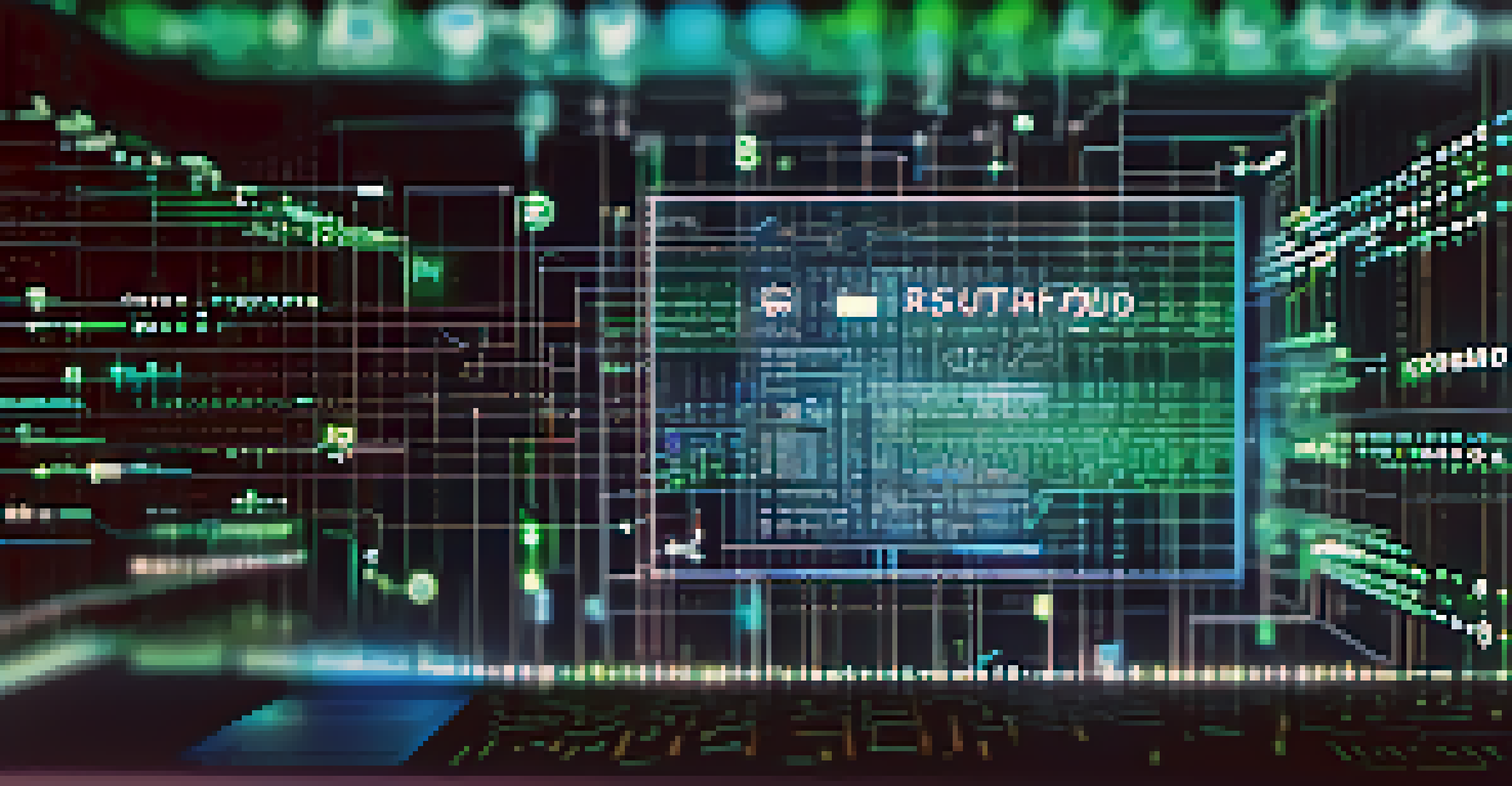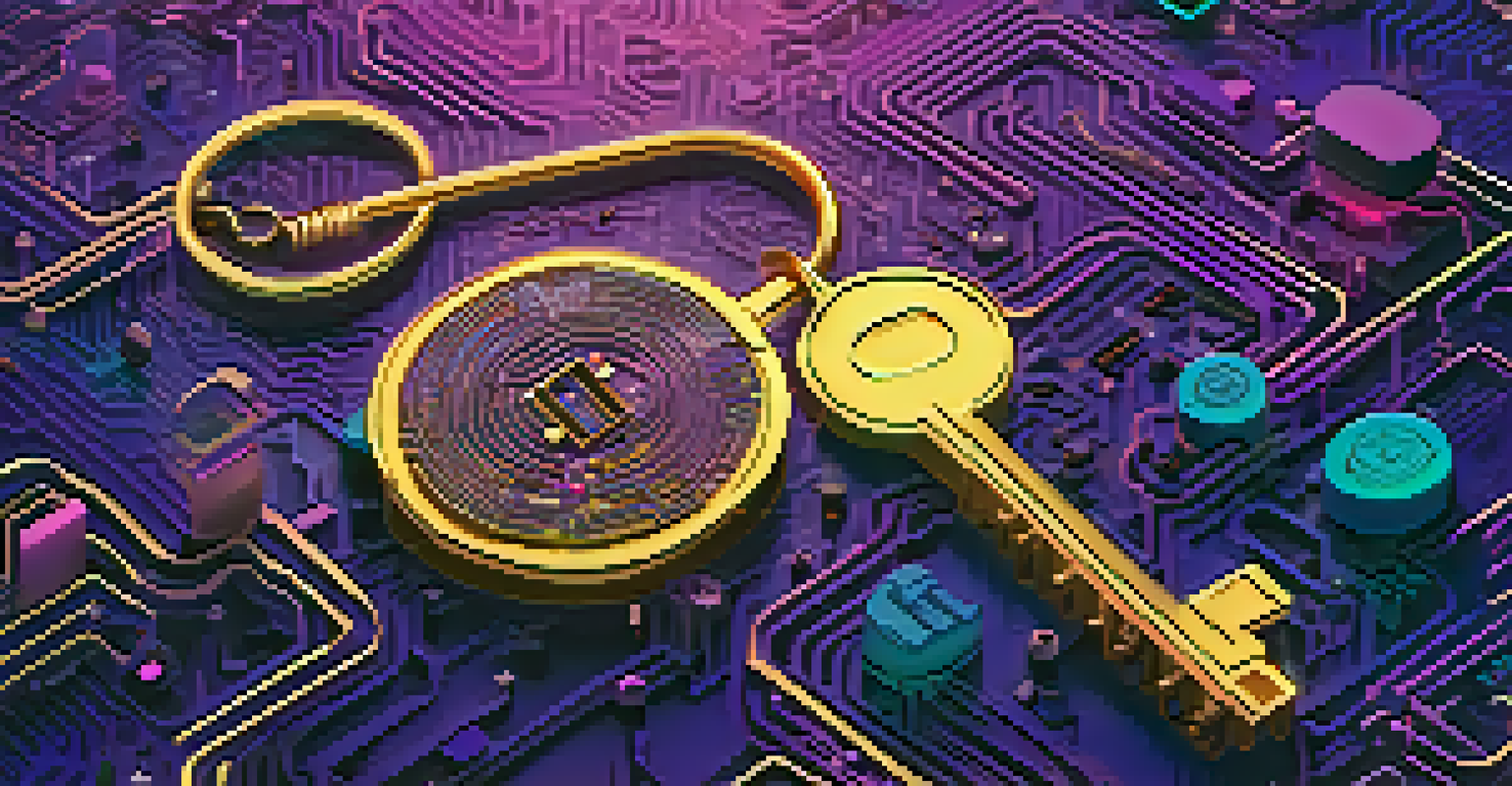The Role of Smart Contracts in NFT Transactions and Ownership

Understanding Smart Contracts and Their Functionality
Smart contracts are self-executing contracts with the terms of the agreement directly written into code. They run on blockchain technology, ensuring transparency and security for all parties involved. This means that once a smart contract is deployed, it automatically executes when conditions are met, without the need for intermediaries.
Smart contracts are like digital vending machines: you put in the right input, and you automatically get the right output without needing a middleman.
For example, when someone purchases an NFT, the smart contract verifies the payment and then transfers ownership of the digital asset seamlessly. This eliminates the risks associated with manual handling, such as fraud or miscommunication. So, think of smart contracts as digital escrow services that ensure safe and reliable transactions.
Overall, smart contracts simplify processes, reduce costs, and enhance trust among users. They play a crucial role in the NFT space by ensuring that all transactions are carried out efficiently and fairly.
How Smart Contracts Facilitate NFT Transactions
In NFT transactions, smart contracts handle everything from verifying ownership to executing sales. When an NFT is minted, the smart contract records all relevant details, such as the creator's information and transaction history, directly onto the blockchain. This creates a transparent and tamper-proof record that can be accessed by anyone.

Moreover, when a buyer decides to purchase an NFT, the smart contract automatically transfers the token to the buyer while simultaneously sending the payment to the seller. This process is quick and minimizes the potential for disputes, making it an attractive option for both buyers and sellers.
Smart Contracts Automate Transactions
Smart contracts automatically execute transactions when conditions are met, eliminating the need for intermediaries and enhancing efficiency.
In essence, smart contracts act as the backbone of NFT transactions, ensuring that each step is executed flawlessly. Their automation and transparency foster a more trustworthy environment, crucial for the burgeoning world of digital collectibles.
The Importance of Ownership Verification in NFTs
Ownership verification is a critical aspect of NFTs, as it determines who possesses a digital asset. Smart contracts play a pivotal role in this process by securely recording ownership details on the blockchain. This makes it virtually impossible for anyone to counterfeit or falsify ownership claims.
The blockchain is the ultimate trust machine, and smart contracts are the tools that help us build trust in the digital economy.
For instance, when an artist creates an NFT, the smart contract establishes their ownership and attributes it to the unique token. When the NFT is sold, the smart contract updates the ownership information accordingly, ensuring that the buyer receives a legitimate asset. This traceable ownership history adds significant value to NFTs.
Without smart contracts, the concept of ownership in the digital realm would be much more complex and prone to fraud. They provide a reliable solution for verifying ownership, which is essential for maintaining the integrity of the NFT market.
Smart Contracts and Royalties in NFT Sales
One of the most compelling features of smart contracts in NFT transactions is the ability to enforce royalty payments automatically. Artists can set up their smart contracts to receive a percentage of sales every time their NFT is resold. This ensures they continue to benefit from their work as it changes hands in the secondary market.
For example, if an artist sells an NFT for $100 and later includes a 10% royalty in the smart contract, they will receive $10 each time that NFT is sold again. This system not only incentivizes creators but also fosters a sustainable ecosystem for artists in the digital space.
Ownership Verification is Essential
Smart contracts securely record ownership on the blockchain, making it nearly impossible to falsify ownership claims in the NFT space.
In a world where artists often struggle with fair compensation, smart contracts provide an innovative solution. They empower creators to maintain a continuous revenue stream while ensuring that their rights are respected in every transaction.
Potential Challenges with Smart Contracts in NFTs
While smart contracts offer many benefits, they are not without their challenges. One significant issue is the potential for coding errors. If a smart contract is not written correctly, it could lead to unintended consequences, such as lost funds or assets. This highlights the importance of thorough testing and auditing before deployment.
Additionally, the immutability of blockchain means that once a smart contract is live, it cannot be altered. This can pose a problem if a flaw is discovered after the fact, as there’s no way to fix it without creating a new contract. Users must be diligent in understanding the terms of a smart contract before engaging in transactions.
Therefore, while smart contracts represent a leap forward in terms of security and efficiency, they also require users to exercise caution and due diligence. Awareness of these challenges can help individuals navigate the NFT landscape more effectively.
The Future of Smart Contracts in the NFT Space
The landscape of NFTs is continuously evolving, and smart contracts are at the forefront of this transformation. As the technology matures, we can anticipate more sophisticated smart contracts that offer enhanced features such as multi-signature approvals and automated dispute resolution. These advancements will make transactions even more secure and user-friendly.
Moreover, as more industries begin to explore the potential of NFTs—ranging from art to real estate and gaming—the demand for innovative smart contracts will only increase. This could lead to new standards and practices that further streamline processes and promote trust in digital transactions.
Royalties Support Artist Compensation
Smart contracts enable artists to earn royalties automatically with each resale of their NFTs, fostering a sustainable ecosystem.
In short, the future of smart contracts in the NFT space is bright. They will likely play an even more significant role in shaping how we buy, sell, and trade digital assets, ultimately making the market more accessible and efficient for everyone.
Conclusion: Embracing Smart Contracts for NFT Success
In conclusion, smart contracts are revolutionizing the way we engage with NFTs and digital ownership. By automating transactions, ensuring ownership verification, and facilitating fair compensation through royalties, they provide a robust framework for the NFT ecosystem. Embracing this technology can lead to more secure and efficient transactions for both buyers and sellers.
As the NFT market continues to grow, understanding the role of smart contracts will be essential for anyone looking to participate. Whether you're an artist, collector, or investor, being informed about how smart contracts work can give you a competitive edge in this exciting space.

Ultimately, smart contracts are not just a technological advancement; they represent a shift towards a more equitable and transparent digital economy. By harnessing their potential, we can unlock new opportunities and ensure the sustainable growth of the NFT market.